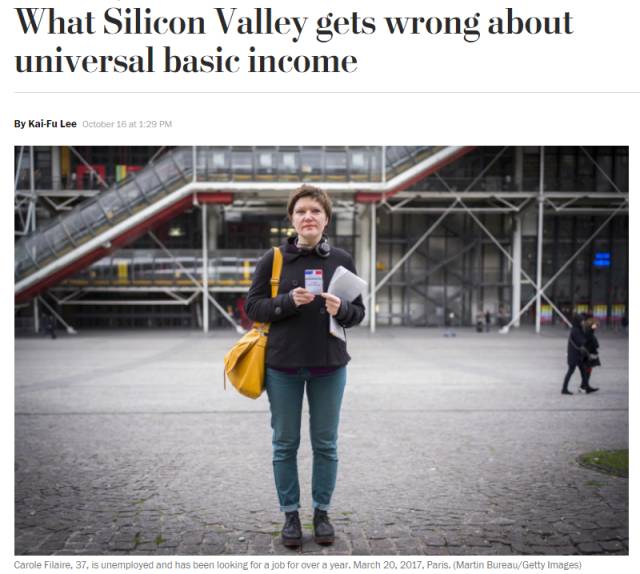李開復華盛頓郵報專欄:發錢解決AI失業潮?硅谷大咖太天真
人工智能革命即將到來,這可能是一個最好的時代,也可能是最壞的時代。
好與壞,將取決于我們如何解決人工智能的副作用之一——失業問題。
昨天,我在《華盛頓郵報》寫了一篇文章,分享給大家。
根據牛津大學的一項研究,在未來的十年內,近一半的美國工作崗位將被機器人取代。這種情況在其他國家也不樂觀。
如何為即將出現的大規模失業人口提供幫助,是關心未來的企業家和政府都在探討的話題。
在硅谷,目前正在被熱議的解決方案之一,是向失業工人發放“全民基本收入”。
“全民基本收入”(英文縮寫:UBI,Universal Basic Income),是指在不考慮每個人的需求、就業狀況或者技能水平的情況下,政府為每位公民提供固定的津貼。
雖然馬克·扎克伯格和埃隆·馬斯克對AI的觀點經常針鋒相對,但他們在UBI計劃上卻很有默契。
今年5月,扎克伯格在哈佛大學的畢業生典禮上發表演講稱,政府應該考慮為所有美國人提供全民基本收入。馬斯克也認為,全民基本收入的普及是最好的解決方案。
硅谷之外,對UBI的討論已遍及全球。在瑞士、芬蘭、法國、荷蘭、加拿大等國家,UBI或已開始付諸實驗,或被引為競選綱領,甚至有望成為國家政策。
但反對UBI的聲音也有很多擁躉,比如美國前總統奧巴馬首席經濟顧問詹森·弗曼(Jason Furman)。他認為,UBI意味著巨額稅收的增加,“當你看到細節時,發現結果是行不通的。”
但我認為,全民基本收入”代表一個良好的開端,但這還不夠。僅靠UBI,遠遠無法讓失業工人贏得一個穩定的未來。
這是因為,大部分失業工人并不具備先進技術或人脈網絡,也沒有足以應付人工智能挑戰的前瞻性。雖然可以憑借意外之財找到新工作,但很有可能在短時間內被辭退,或者再次被人工智能替代。
因此,我們必須努力尋找一種全面的解決方案,而不僅僅是分配資金。只有這樣,驚人的AI革命才會帶領我們實現創造性的文藝復興。
以下是文章全文,經創新工場翻譯整理。點擊閱讀原文,查看華盛頓郵報官網文章。
標題:硅谷在“全民基本收入”方面到底做錯了什么?
“全民基本收入”并不能刺激大多數人實現自身專業重塑
未來十年,約有一半的工作將不再需要人類勞動力。
在不久的未來,人工智能和機器人將以迅雷不及掩耳之勢取代全球范圍內的普通職業和機械職業。
這一巨大的挑戰為傳統的“全民基本收入”(英文縮寫:UBI,Universal Basic Income)這一概念注入了新的活力。“全民基本收入”,是指在不考慮每個人的需求、就業狀況或者技能水平的情況下,政府為每位公民提供固定的津貼。
在這樣的假設下,我們是不是還要盲目地向每位員工發10000美元的薪資呢?絕對不是。
“全民基本收入”能發揮作用實現價值,需要所有被辭退的員工,具備和硅谷領導者一樣的素質。樂觀主義者天真地認為,“全民基本收入”將會刺激員工努力提升專業水平。
但事實上,一個成功的硅谷企業家,擁有多項能力,以及企業家精神、經驗以及人際網絡,這些能幫助他們實現從賺取中等“全民基本收入”到擁有新一代科技帝國。
但這種事情不會發生在普通的失業工人身上,由于他們的技術較為落后,肯定不會成為新一代科技帝國的締造者。
分給失業工人的意外之財可能會幫助一部分人找到新的工作,但在多數情況下,這類工人在找到新的工作之后,在較短的時間內會再次被辭退。
多數失業工人并不具備前瞻性,無法預測人工智能時代社會還需要哪些崗位的專業人員,因此也無從了解如何理智地使用“全民基本收入”來為自己贏得一個穩定的未來。
我們必須努力尋找一種全面的解決方案,包括創造新的職業、價值和社會規范,而不僅僅是重新分配資金。此外,我們需要重新進行培訓教育,確保所有人都能夠在適合自己的崗位上工作。
為了實現上述目標,下列五項是當前需解決的緊迫任務:
保障生存
當務之急就是創建并支持項目發展,確保所有人都能有所食、有所居,并享基本醫療保障。
提升創造性工作的價值
只有人類能夠創造和提出創新項目。目前,人工智能還不能跳出固有的思維模式,只能根據人工設定采用最優化的方式處理問題。
因此,在早期教育中,我們必須確保教育系統不會成為好奇心、創造力、批判性思維和個性發展的絆腳石。我們要增加對初中和高中天才和資優教育計劃的投資。而在高等院校方面,我們需要創建項目,幫助具有創造潛力的學生掌握人工智能工具。
增加社會就業
人工智能既不能表達愛意和同情,也不能建立無可取代的社會關系,但是人類可以。創造性工作雖然無法輕松學會,但社會職業培訓可以。
我相信,隨著人工智能將產生的數萬億投資,人與人服務方面的消費性支出也將水漲船高,需要人類接觸的社會工作者、醫生、教師以及人生導師等服務性工作的需求,將會高居不下。
此外,客戶與人工智能之間的中介這類新型社會工作將會被創建。例如,醫學顧問可能會使用人工智能診斷工具幫助患者解決問題并提供補充性建議。此類工作往往屬于高薪工作。
鼓勵志愿者服務
我們需要創建更多的志愿者服務項目,為對高技能專業不感興趣或者擁有全套高技能的退休工人以及失業工人提供幫助。此外,我們還應該考慮向志愿者提供報酬。
重新定義職業倫理
每個人都有實現自我價值的需要,從而相信自身的存在是有意義的。然而,工業革命灌輸了一種錯誤的社會規范思想,即自我價值主要源自傳統職業倫理——如果你努力工作,就會得到報酬。但是隨著人工智能的發展,不斷從事重復性工作的職業在未來將會完全消失。
因此,我們就需要根據新的工作模式重新定義職業倫理。一份工作的重要性不應該僅僅取決于這份工作的經濟價值,也取決于其創造的社會價值。長期以來我們都認為工作時間越長實現成功的幾率就越大。我們應該摒除這種觀點,并摒棄對服務行業的歧視態度。
人工智能革命即將到來,與之而來的將是最好的時代或者是最壞的時代。革命的成果將取決于我們是選擇被天真的樂觀主義毒害,還是努力全面解決問題。
“全民基本收入”代表一個良好的開端,但是很顯然這還遠遠不夠。我們還需要進一步認真探討并在短期內進行實驗。只有這樣,這一驚人的革命才會帶領我們實現創造性的文藝復興。
◀英文原文▶
What Silicon Valley gets wrong about universal basic income
For most people, it won’t actually be a catalyst for professional reinvention.
Kai-Fu Lee is the chairman and chief executive of Sinovation Ventures, a venture capital firm,and the president of its Artificial Intelligence Institute.
BEIJING— In the next decade, roughly half of all jobs will disappear. Routine and mechanical occupations will soon be replaced by artificial intelligence and robots at an unprecedented rate across the globe. This enormous challenge has breathed new life into an old idea called universal basic income, or UBI, in which the government provides a steady stipend for each citizen regardless of need,employment status or skill level.
So should we blindly give $10,000 to everyone then? Absolutely not.
UBI makes sense only when Silicon Valley leaders project their own personas onto all the workers who will be displaced. The optimists naively assume that UBI will be a catalyst for people to reinvent themselves professionally. Indeed, if we’re talking about a successful Silicon Valley entrepreneur, his or her skills, entrepreneurship,experience and network may successfully help turn a modest UBI income into the next tech empire. But this most surely will not happen for the masses of displaced workers with obsolete skills living in regions where job loss is exacerbated by traditional economic downturn.
Free money given out to displaced workers may serendipitously help a few find work, but more likely, they will just move on to a new job that will also be eliminated soon. This is a familiar pattern we have seen throughout the workforce. The truck driver who once worked on an assembly line in a factory will soon have to learn to become something else. Most displaced workers will not have the foresight to predict which professions might survive the AI revolution and therefore won’t know how to best use the UBI money to ensure a stable future.
Instead of just redistributing cash and hoping for the best, we must work together to find a comprehensive solution, including establishing new professions, values and social norms. And we need to retrain and adapt so that everyone can find a profession that suits his or her interests. Here are five imperatives to get us there:
Guarantee subsistence.
The first priority is to create and support programs to ensure no one goes hungry or without shelter and basic health care.
Maximize creative jobs.
Only humans can create and come up with new innovations. AI today cannot think outside the box, and it can only optimize problems defined by humans. Thus, in early education, we must ensure that the system does not inhibit curiosity, creativity, critical thinking and individuality. In middle school and high school, we should increase funding for gifted and talented programs. In colleges, we need programs that help students with creative potential learn to master AI tools.
Increase social jobs.
AI cannot express love and empathy and cannot build irreplaceable social connections –only people can. And unlike creative professions, which cannot easily be taught, people can be trained in a large number of social professions. Furthermore, with the projected trillions I believe AI will generate, consumer spending will go up and with it, spending on people-to-people services.
This means service jobs that require a human touch – social workers, therapists, teachers and life coaches – will be in high demand. Furthermore, new social jobs will be invented in which humans will serve as an intermediary of sorts between patrons and AI. For example, a medical consultant might help patients trouble shoot and give supplemental advice when using an AI diagnostic tool. Some of these jobs will even be highly paid.
Encourage voluntarism.
We need to create more volunteer programs to assist retired and displaced workers with little interest in or skillset for higher skilled professions. We should also consider compensating people who volunteer.
Redefine work ethic.
Everyone has a need to feel a sense of self-worth and self-actualization – that he or she believes his or her existence is meaningful. Unfortunately, the Industrial Revolution wrongfully instilled a social norm that self-worth should primarily come from work ethic –if you work hard, you will be rewarded. But because of AI, jobs based on repetitive tasks will soon be gone forever.
We need to redefine the idea of work ethic for the new workforce paradigm. The importance of a job should not be solely dependent on its economic value but should also be measured by what it adds to society. We should also reassess our notion that longer work hours are the best way to achieve success and remove the stigma associated with service professions.
The coming AI revolution will bring about either the best of times or the worst oftimes. The outcome will depend on whether we choose to be intoxicated by naive optimism or committed to comprehensive problem solving. UBI is a good start,but it is clearly not enough.
We need to debate earnestly and experiment rapidly. Only then will this amazing revolution lead us to a creative renaissance.
(This was produced by TheWorldPost, a partnership of the Berggruen Institute and The Washington Post.)

































